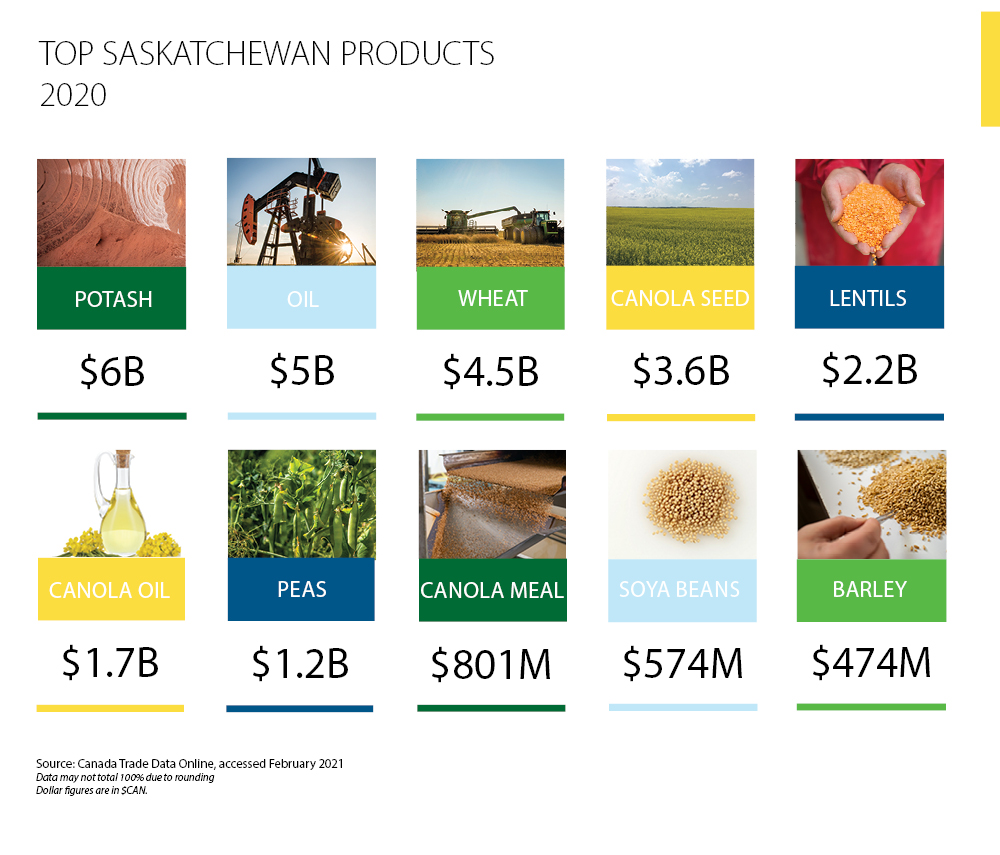The Saskatchewan government is moving full steam ahead on its plan to open four new international export offices.

The offices will be opening in London, United Kingdom; Dubai, United Arab Emirates; Mexico City, Mexico; and Ho Chi Minh City, Vietnam.
The move will give Saskatchewan a stronger presence in those regions, by expanding the province’s international network, according to the government.
The province says the establishment of these spaces is being implemented in an effort to facilitate investment trade efforts to grow and diversify Saskatchewan’s exports, assisting in COVID-19 economic recovery.
“Now we’re going through the process of hiring managing directors for those offices and we hope to have two of them open in November and two more in the first quarter of the calendar year,” said Jeremy Harrison, Saskatchewan Minister of Trade and Export Development.
The number of international offices will be doubling as the province already has a permanent presence in Japan, India, Singapore and China.
The offices in Japan, India and Singapore were open for businesses earlier this year, whereas the one in Shanghai, China has been operational since 2010.
Staff at the offices work full-time for the provincial government to promote trade and economic interests.
Harrison says despite the pandemic, Saskatchewan companies are able to export approximately 65 per cent of what they produce.
Some popular export items include potash, oil, wheat, canola seeds, lentils, canola oil, peas, canola meal, soya beans, and barley.
Just like the cost to export these products, operating those international offices isn’t cheap.
“It’s about a million dollars per year, per office, our entire international engagement will be about $9 million this year with the eight offices and the administration associated with that, but I mean with the return on investment being over $30 billion of international trade last year…” Harrison explained.

Get breaking National news
“Of course the offices aren’t responsible for every dollar of that trade, but that being said, having that long-term, on-the-ground presence really has paid significant dividends to the province, we would view it as being a tremendous return on investment,” he added.
Harrison also says with Saskatchewan negotiating its own deals, rather than the Canadian government, the province has been able to secure lower tariffs.

The trade and export development minister goes on to say the Saskatchewan government decided to take trade matters into its own hands, opposed to relying on the federal government because it believes it can secure better deals overall.
In 2019, the minister, with the help of former Conservative Canadian Prime Minister Stephen Harper and his company called Harper and Associates, lobbied senior officials with the government of India to lower tariffs on Saskatchewan peas and lentils.
Harper and Associates is being paid for its role in assisting with the establishment of the international offices. The contract is yearly, and is renewed annually.
Harrison said the meeting resulted in the province temporarily reducing the tariff from 30 per cent to 10 per cent from June to August in 2020 and onwards.
Jason Childs, associate professor of economics with the University of Regina explains why the provincial government may have felt enticed not to leave trade matters to federal government officials.
“I think the perception that Saskatchewan feels underrepresented abroad and our interests aren’t being served, I think that says a lot about what’s going on,” Childs said.
He adds international offices are not uncommon among provinces in Canada, and they are supported across party lines.

By Saskatchewan being at the helm of its own trading decisions, Childs says the province can head trade missions that are dedicated to vouching for the specific agricultural products the province has to offer the rest of the world.
“So, the products we produce here in Saskatchewan, are going to be radically different than say the products produced in Quebec or southern Ontario, which are much more manufacturing-driven,” Childs said.
He says if the Canadian government was making these deals, then time government officials spend on having to represent the other jurisdictions across the country would be split.
Childs continues to say there are some notable benefits to Saskatchewan having its own international trading partners to advocate its own interests to, rather than other Canadian provinces or somewhere else in North America.
“Sheer population, sheer market size, the Canadian market is only 38 million people, whereas some of the countries we’re talking about Vietnam, China, India and the U.K., there’s hundreds of millions, billions of people involved, right so it’s a much larger market,” Childs said.
Harrison says these exports will bring numerous job opportunities to residents.
—With files from Mickey Djuric









Comments
Want to discuss? Please read our Commenting Policy first.